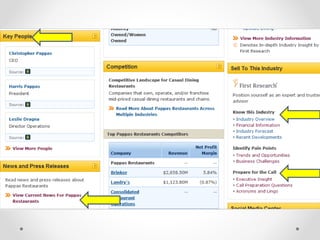Chapter 8 handling objections sp12
- 2. So…So What? • Introduction to • Prepared to enter a handling objections sales job upon o Discussion graduation • Types of objections o Understand your client o Practice techniques • Techniques for o Attitude and behavior handling objections o Group exercise • Recap and wrap up
- 4. Objection Objectives • What is an objection? • Why do customers object? • Techniques to overcome objections • Attitude and behavior of sales associates
- 5. Sales Objection… what is it? Definition: An expression of buyer concern Rather than argue for a point when an objection is raised, a salesperson can be more successful by listening, or probing, to find out why it is an objection.
- 6. A Sales Objection is NOT… TI ON • an Argument Cannot force a need REJ EC upon an organization • People are emotional • According to the Sales and subjective Career Training Institute's ongoing surveys regarding sales objections, rejection by prospects is the number one fear - and therefore, the number one de-motivator of salespeople across all industries.
- 7. Three Reasons Behind Objections 1. Objections may occur because the prospect is ready to buy but wants to confirm the purchase decision with another decision-maker, get a better deal or otherwise stall you in order to meet their own objectives. 2. Objections may occur because the prospect has doubts, fears or unanswered questions about your product, service or you as a salesperson. 3. Objections may occur simply because the prospect does not want to buy.
- 8. Finding the right contact “Mr. Smith handles all of our events” “I’m not interested in sales people” “What’s in it for me?” “I’m not the decision maker” “I’ll think it over”
- 9. 1 2
- 10. Type in company name here
- 13. The unknown “the risk is too great” “what are you offering?” “I don’t have enough time to figure out the details” “Isn’t your hotel under renovation?” “Wasn’t your restaurant closed for health violations?”
- 14. ASK Questions and Qualify Feedback • Have I explained myself • Don’t try to deal with clearly? the objection until you • Do you have any other fully understand it. questions before we move on? • Is that the only reason you are not buying? • Does this satisfy your concern regarding…?
- 15. It’s not for me “It’s too expensive” “I don’t like your hotel/location” “My boss doesn’t like your brand” “You don’t offer free parking/free breakfast” “Your customer service is awful”
- 16. Overcoming Objections 1. Listen o Do not interrupt the prospect 1. Check for understanding 2. Remain positive 3. Empathize 4. Provide evidence and convince buyer
- 17. Step 1 • LISTEN to what the buyer has to say. • Make sure not to interrupt even if they buyer is complaining about something you immediately know how to resolve.
- 18. Step 2 • Make sure you CHECK to see if you understand exactly what the problem is. • Repeat what they said if necessary and conform what the issue is (active listening).
- 19. Step 3 • REMAIN POSITIVE. Make sure not to argue with the customer but simply make a positive statement. • Make sure to fully understand a complaint before you try and resolve it.
- 20. Step 4 • EMPATHIZE with your customer. • Let the customer know his/her complaint is very valid and that he/she is not the only one to object to a similar issue.
- 21. Step 5 • PROVIDE EVIDENCE and CONVINCE your customer that his/her complaint can be resolved. • This stage is the most important • Each complaint requires a unique solution • Some complaints could be masking something else the buyer doesn’t like. • Offering discounts or providing proof are different possible ways of convincing your customer to make a purchase.
- 22. Step 6 • After trying to resolve the customer complaint it’s time to MOVE BACK to your work in progress. • You are first and foremost trying to sell your product. • Resolving a complaint doesn’t guarantee a purchase
- 23. A comfortable work A place to connect environment A refreshed morning night’s sleep A great
- 24. Sell the benefit, not the feature: A great night’s sleep A comfortable work environment If there is no A place to connect Where big ideas come together A refreshed morning A great start to the day Then there is no
- 25. Attitude and Behavior • Empathy • Stay Positive o Acknowledge your o Objections WILL come customers concerns up, don’t overreact to o “I can understand them how you feel” or “I’m o You can WIN the glad you brought that argument but LOSE up” the sale o Practice Emotional o Get the customer in a Intelligence “yes” frame of mind o *** this does not mean you have to agree***
- 26. Make the Commitment • Ask the prospect to commit to something o Make an appointment to visit with them in person o Book the business!
Editor's Notes
- Listen to what the buyer has to say. Make sure not to interrupt even if they buyer is complaining about something you immediately know how to resolve.
- Convince your customer that hid/her complaint can be resolved. This stage is the most important part of your sales complaint resolution. each complaint requires a unique solution and some complaints could simply to masking something else the buyer doesn’t like. Offering discounts or providing proof are different possible ways of convincing your customer to make a purchase.


























